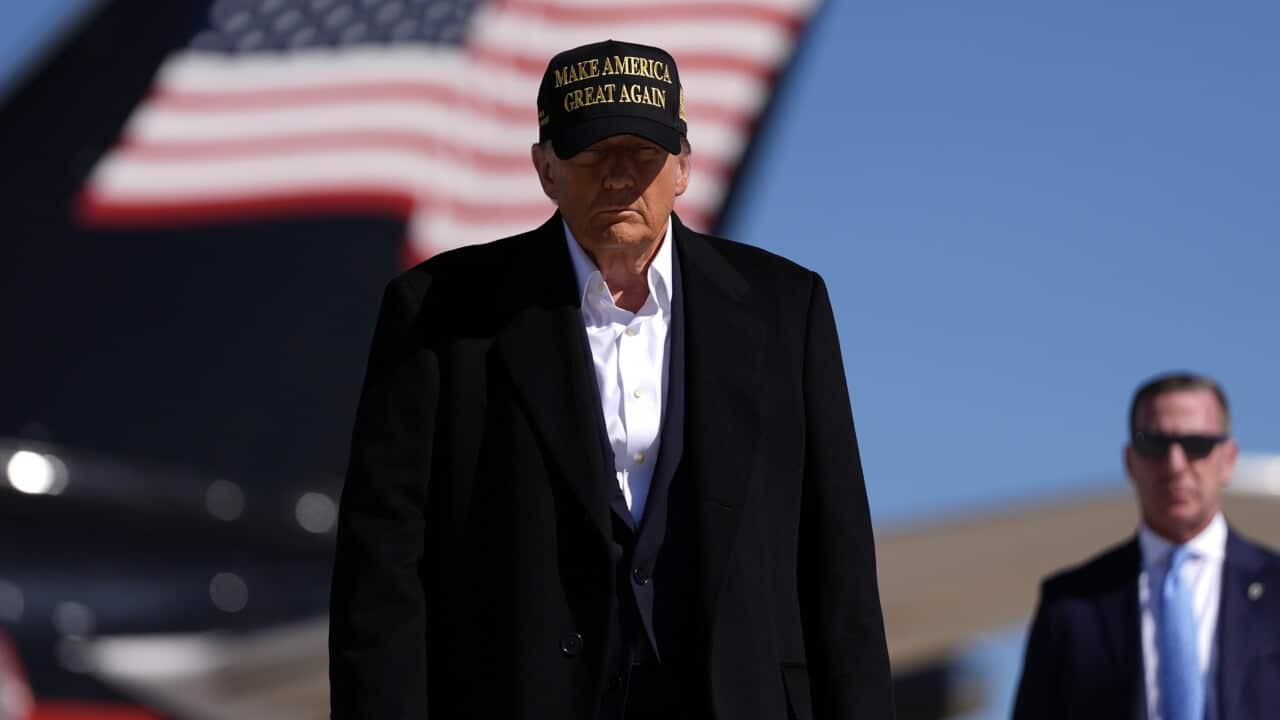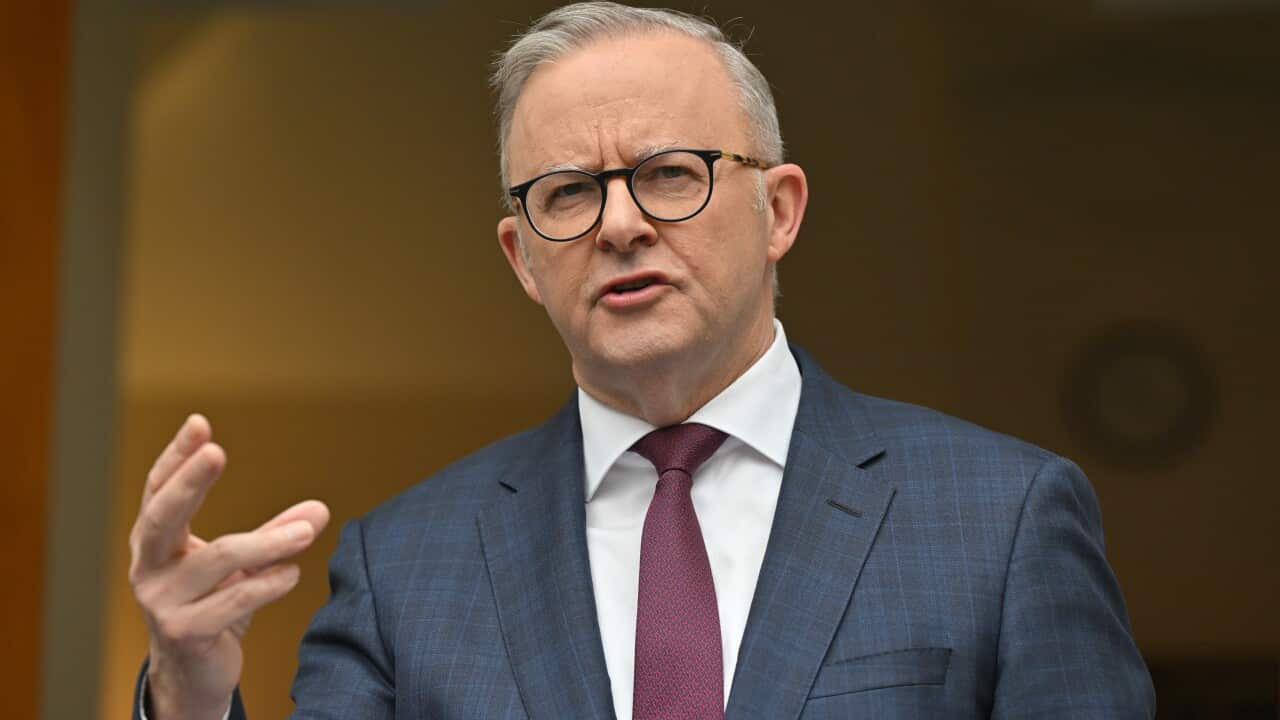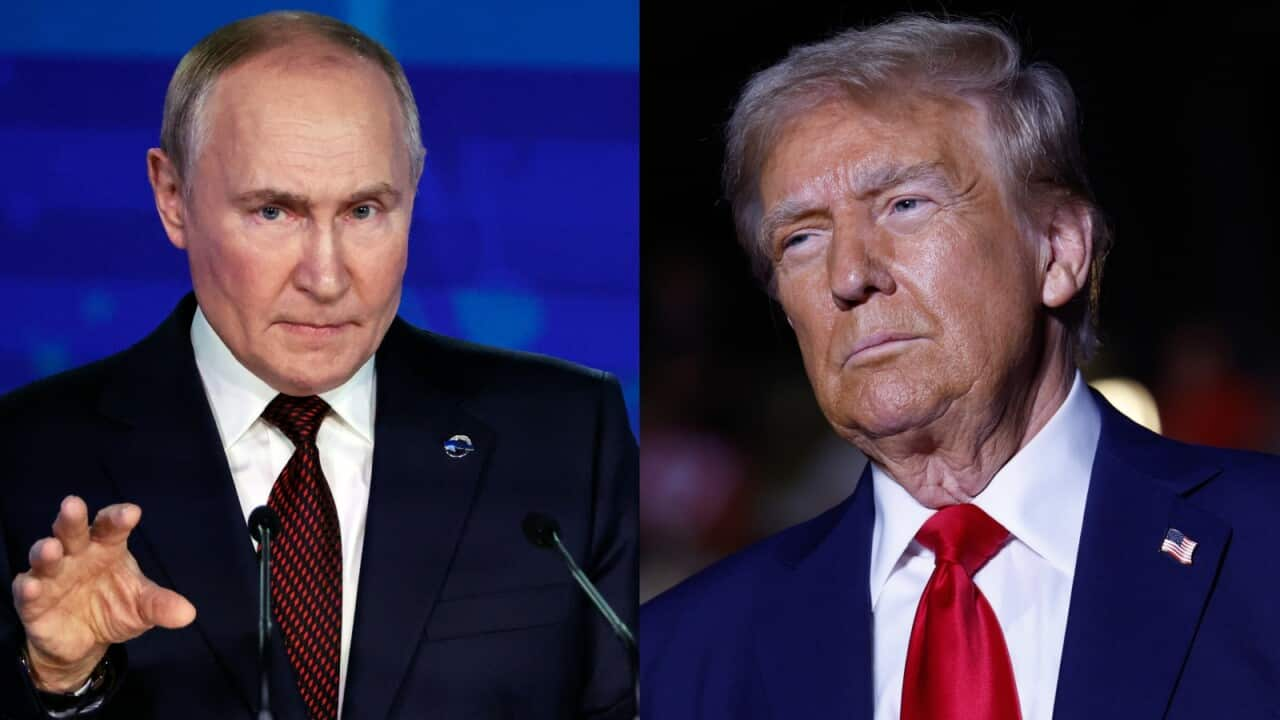Comparing Donald Trump to extreme leaders like Adolf Hitler can seem excessive but experts warn it’s not as ludicrous as it seems.
The United States has been labelled a “fascist” in recent weeks by his and by his former chief of staff, John Kelly.
Speaking to the New York Times, Kelly — Trump’s longest-serving White House chief of staff — says he thought Trump fit the definition of fascist he found online.
“It’s a far-right authoritarian, ultranationalist political ideology and movement characterised by a dictatorial leader, centralised autocracy, militarism, forcible suppression of opposition, belief in a natural social hierarchy,” Kelly noted.
The retired general recalls Trump saying that “[Nazi leader] Hitler did some good things too”. Another article in The Atlantic reports Trump saying he “wanted generals like Adolf Hitler had” who were loyal to him, although Trump denies saying this.
Donald Trump has denied saying he “wanted generals like Adolf Hitler had”. Source: Getty / Bettmann Archive
Kelly’s comments come amid fears that to replace thousands of federal government workers with people loyal to Trump — could centralise power in the White House if the former president is re-elected.
Trump claims to “know nothing” about the project, but many of the more extreme proposals in the foundation’s handbook echo remarks he has made at his rallies.
This week, parallels were also drawn between Trump’s rally at New York’s Madison Square Gardens on Sunday night and an infamous 1939 rally of American fascists in the same venue.
Trump has brushed aside the fascist label, saying: “The newest line from Kamala and her campaign is that everyone who isn’t voting for her is a Nazi.”
“I’m not a Nazi. I’m the opposite of a Nazi.”
This week, comparisons emerged between Donald Trump’s rally at Madison Square Garden and a notorious 1939 American fascist rally at the same venue. Source: Getty / New York Daily News Archive
Donald Trump has dismissed the fascist label, stating: “The latest line from Kamala and her campaign is that anyone not voting for her is a Nazi.” Source: Getty / Anna Moneymaker
Dr Ángel Alcalde, a history lecturer at the University of Melbourne who is writing a book on the global history of fascism, says it’s important to understand whether Trump is a fascist because the ideology has led to some of the worst human-made disasters in history.
“These included not only the proliferation of political violence, the systematic destruction of rights and liberties, and totalitarian repression under dictatorial regimes, but also destructive wars of aggression and genocides with millions of victims,” he said.
“It’s plausible that these could happen again in comparable ways.”
What is a fascist?
Alcalde says “fascism” is basically what the far-right was called in the past.
It is associated with beliefs that people would now consider far-right ideology: ultranationalism, anti-socialism, anti-liberalism, the glorification of violence and war, racism (including antisemitism), authoritarianism and the promotion of charismatic leadership.
More specifically, the term fascism became a generic label to describe the far-right political movements, ideologies and authoritarian regimes that became powerful during the 1920s, 1930s and World War Two, Alcalde says.
Nazi leader Adolf Hitler, who sanctioned the Holocaust — the World War Two genocide during which six million Jews were murdered — is considered a fascist.
But prior to Hitler, fascism was associated with Italian dictator Benito Mussolini, who created fascism as a political movement.
There is a long historical tradition of the far right, and fascism is just the most notorious phase of it.
Dr Ángel Alcalde, University of Melbourne
“The historical record is very clear and, I would emphasise, very well known.”
Does admiring Hitler make you a fascist?
To determine whether someone is a fascist, Alcalde says it is important to consider the person’s connection to fascist ideas, political parties and people from the past.
“Certainly the expression of admiration for, and the intention to emulate, Hitler is very clear evidence that justifies calling Trump a fascist,” Alcalde said.
Trump has also praised dictators like Russian President Vladimir Putin and far-right governments, including that of Viktor Orbán in Hungary, which has links to Hungarian fascism and antisemitism.
Donald Trump (right) has praised Russian President Vladimir Putin as a “genius” and “pretty savvy”. Source: Getty / Brendan Smialowski/AFP
Alcalde says some of Trump’s statements are extremely similar and sometimes identical to what Hitler and Mussolini have said in the past.
This includes that he would be a “dictator for one day”, describing political opponents as an “enemy from within”, and refusing to accept the results of his failed 2020 presidential bid by urging his supporters to “fight like hell”.
“Particularly [relevant is] the promotion of political violence as a struggle for power against an alleged ‘enemy within’, [which is a reference to] political opponents, the political left and ethnic minorities,” Alcalde said.
Witnessing these things today, historians with expertise in fascism live with a permanent impression of déjà vu. The same phenomena characterised the rise of fascism in Europe and the world in the 1920s and 1930s.
Dr Ángel Alcalde, University of Melbourne
The ‘red flag’ that raises concerns among experts
Federico Finchelstein, a historian at the New School for Social Research and Eugene Lang College in New York City who specialises in extremism and transatlantic fascism, says the four key elements of fascism are political violence, propaganda and misinformation, xenophobia and dictatorship.
“[Trump is] an extreme version of populism that is getting closer to fascism,” Finchelstein told AFP.
History doesn’t repeat itself, but this is already a red flag that we are even considering the question.
Federico Finchelstein, New School for Social Research
“There is a risk here that Trump will become as authoritarian as he would like to be.”
Finchelstein says the problem is not the extremism but rather that it is being normalised.
“This used to be toxic politics, and suddenly it’s not,” he said.
“We are talking about a candidate that promises mass deportations under the framework of what he thinks of as problems related to risk and genetics: This is really extreme.”
Immigration has been the main theme of Donald Trump’s re-election campaign. Source: Getty / Justin Sullivan
Trump inspires ‘blind obedience’
Alcalde says there are other factors that justify describing Trump as a fascist.
He points to Trump’s charismatic style of leadership and the “blind obedience and submission” observed by his followers.
The former president also has close relationships with political and media networks of the American and the far-right globally, including Steve Bannon — a former executive chairman of Breitbart News — who acted as Trump’s White House chief strategist.
Finchelstein notes the former president of Brazil, Jair Bolsonaro, was barred from office after he falsely attributed his election loss in 2022 to fraud. But Trump did not suffer the same fate after making an identical claim, leading his supporters to storm the Capitol on 6 January 2021, following his 2020 presidential election loss.
“The January 6 riot, technically speaking, was an [attempted] coup d’état. And one wonders how often it was presented as such.”
Protesters stormed Washington’s Capitol building on 6 January 2021 after Donald Trump said the presidential election was stolen from him. Source: Getty / Kent Nishimura/Los Angeles Times
Neo-Nazis love Donald Trump
Alcalde says the fact that neo-fascist, neo-Nazi and far-right groups all around the world are generally enthusiastic supporters and even imitators of Trump further justifies him being labelled as a fascist.
Trump has expressed a desire to “purge” the nation of certain undesirable groups and undertaken a “relentless and systematic demonisation of ethnic minorities and migrants.
“Trump’s populistic discourse claims to be representing the true essences of ‘the people’ and the nation against ‘outsiders’,” Alcalde said.
The use and promotion of baseless conspiracy theories and fanciful beliefs to encourage hatred against minorities and political opponents were also prominent tactics used to fuel the antisemitism of the Nazis, Alcade explains.
He says Trump’s promotion of a radical renewal of the nation, seen in his slogan ‘Make America Great Again’ could be considered an example of “palingenetic ultra-nationalism” — meaning “true fascism” — which historians have identified as a defining element of the ideology.
The use of religion — including Trump’s comments that he survived an assassination attempt due to the “grace of almighty God” and is a defender of its values — to help him achieve his political ambitions is another factor that links Trump to historical fascist movements.
“All these elements are ingredients of a far-right ideological cocktail that is analogous, and a direct permutation from, historical fascism,” Alcalde said.
Finchelstein warns that Trump could be seen as a “wannabe fascist leader”.
“The question remains: to what extent he will be able to do all the things that he would like to do?”
Additional reporting by AFP




















